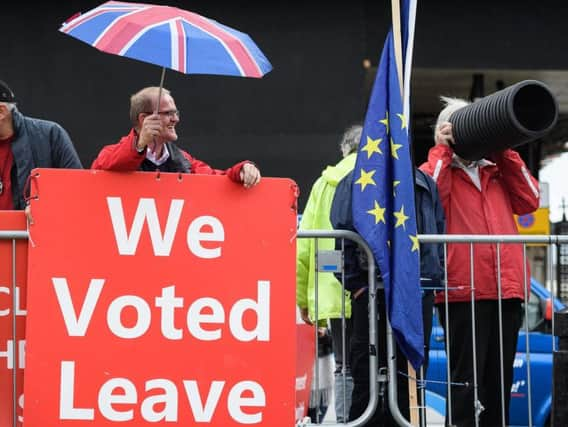Is Brexit an English nationalist project? – Dr Rakib Ehsan


A recent poll has shown that more Scottish people would prefer independence to remaining in the Union, with another survey showing that 60 per cent of Scots believe support for Scottish independence would increase if the UK was to leave the EU on a no-deal basis.
What has been alarming is the absence of a positive, inclusive “post-Brexit” vision which can appeal to Remain-voting Scotland.
Advertisement
Hide AdAdvertisement
Hide AdEnglish Eurosceptic politicians, some who are so pro-Leave to the extent that they are gunning for a no-deal Brexit, appear relaxed over the heightened risk of Scottish separation and the subsequent break-up of the UK.
Pro-Remain, anti-separationist Scots – including those who identify with the Conservative Party – are being particularly let down by pro-Brexit English politicians who advertise themselves as supposedly passionate unionists. Perhaps a profound sense of personal disappointment over the Brexit approach adopted by the Tory leadership at Westminster was the driving force behind Ruth Davidson’s resignation – with the Scottish Conservatives now deprived of her uplifting and charismatic leadership
The unfortunate reality is that Brexit has only served to intensify existing English-Scottish tensions.
The 2016 UK referendum on EU membership was itself a product of Conservative Party internal management, with then PM David Cameron producing a pledge to hold it to help stem the loss of support to the UK Independence Party in the affluent Tory-voting shires in order to appease hard Eurosceptics on his own benches.
Every single Scottish local authority – 32 in total – voted to remain in the EU. Out of the top 20 Remain votes across the UK’s local authorities four were Scottish: Edinburgh (74.4 per cent Remain); East Renfrewshire (74.3 per cent); East Dunbartonshire (71.4 per cent); and Stirling (67.7 per cent). Scotland overall delivered a Remain vote of 62 per cent.
Yes, the referendum was a UK-wide democratic exercise. But the prospect of Remain-voting Scotland being dragged into a no-deal Brexit spearheaded by PM Boris Johnson, who himself seems increasingly focused on wooing Labour Leavers in the provincial Midlands and Northern England, has inevitably provided the SNP and the broader Scottish independence movement with a major boost.
Indeed, a recent poll by YouGov suggests that all 13 Conservative-held seats in Scotland are at risk of falling to the SNP – with the real takeaway figure being that across the 13 constituencies polled, 63 per cent would vote for the UK to remain in the event of a second vote on EU membership (when non-voters and “don’t knows” are excluded).
And much of this is because Brexit is increasingly coming across as an inward-looking English enterprise – one which seems very much at ease with the heightened possibility of Scottish independence. Another poll conducted by YouGov of Conservative Party members demonstrated this very point – with 63 per cent of respondents claiming that Scotland breaking away from the UK was a price worth paying if it was a consequence of Brexit being delivered (with 59 per cent making this same claim in respect of Northern Ireland).
Advertisement
Hide AdAdvertisement
Hide AdThe concern for genuine unionists is that deeper expressions of “Englishness” and “Scottishness” are very much at odds when it comes to the UK’s broader relationship with the EU. While prevailing expressions of English political identity are intertwined with Eurosceptic sentiment, Scottish political identity is associated with a far more positive view of the UK’s membership of the EU.
With this also being the case among young people, there is no doubt that a disruptive no-deal exit from the EU – one led by a Conservative Prime Minister who clearly has little time for the SNP’s 35-strong Westminster contingent, and has so far adopted a belligerent approach to delivering Brexit – could inject considerable youthful energy into the push for a second referendum on Scottish independence.
Considering the political circumstances, genuine pro-Leave unionists – on both sides of the border – have their work cut out if they intend to secure the UK’s withdrawal from the EU as well as neutralising the very real prospect of post-Brexit Scottish independence. As it stands, Brexit could be the straw that breaks the camel’s back – breaking apart our family of nations.
Dr Rakib Ehsan is a research fellow at the Henry Jackson Society